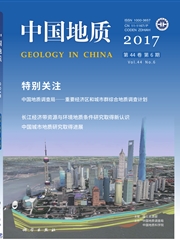

 中文摘要:
中文摘要:
川西上三叠统的须家河组与川中香溪群地层对比问题一直富有争议,而且由于前陆盆地的活动性、不对称性、沉积中心的迁移性等特点让川西—川中地层的划分对比变得更加复杂和困难。本次研究重在借助钻、测井资料的层序地层学分析,并结合露头剖面和地震资料,寻找全区可对比的标志性的层序界面,然后根据地层叠置样式、岩性、岩相的变化以及古生物资料等细分出低位、湖侵和高位体系域,在连井剖面层序对比的基础上建立了川西—川中以四级层序为单元的等时层序地层对比格架,提出了合理的须家河组与香溪群地层对比方案。这对盆地范围的岩相古地理重建、沉积体系的展布、有利相带的预测、油气资源评价等的研究都有重要意义。
 英文摘要:
英文摘要:
Stratigraphic correlation between Xiangxi Group in central Sichuan depression and Xujiahe Formation in western Sichuan depression remains a problem of much controversy.The stratigraphic correlation becomes more complex and difficult because of the activity,asymmetry and deposition center mobility.The landmark sequence boundaries comparable with each other in the whole depression can be identified by stratigraphic sequence analysis of well logging curve,outcrop section,and seismic reflective characteristics.Lowstand,lacustrine transgressive and highstand systems tracts can be subdivided by the stacking patterns of stratigraphy,changes of lithology,lithofacies and palaeontological data.This paper has built up a stratigraphic sequence framework based on the fourth-order sequence of Upper Triassic in western Sichuan and central Sichuan depression on the basis of stratigraphic sequence correlation in well-tied sections,and put forward a reasonable scheme of stratigraphic correlation between Xiangxi Group and Xujiahe Formation.The results obtained are of great significance in such aspects as the reconstruction of the original lithofacies palaeogeography,the distribution of sedimentation,the accurate prediction of favorable facies belts and the evaluation of hydrocarbon resources.
 同期刊论文项目
同期刊论文项目
 同项目期刊论文
同项目期刊论文
 Alkaline diagenesis and its genetic mechanism in the Triassic coal measure strata in the Western Sic
Alkaline diagenesis and its genetic mechanism in the Triassic coal measure strata in the Western Sic The Comparative Analysis of Sequence Characteristics between Different Superimposed Stages of CHELIF
The Comparative Analysis of Sequence Characteristics between Different Superimposed Stages of CHELIF Hemipelagic Deposition of the Silurian Kepingtage Formation in the Tarim Basin and Its Sedimentologi
Hemipelagic Deposition of the Silurian Kepingtage Formation in the Tarim Basin and Its Sedimentologi Source-controlled carbonates in a small Eocene half-graben lake basin (Shulu Sag) in central Hebei P
Source-controlled carbonates in a small Eocene half-graben lake basin (Shulu Sag) in central Hebei P 期刊信息
期刊信息
